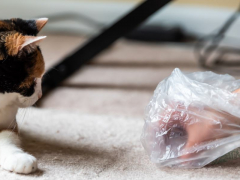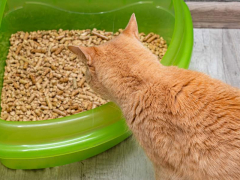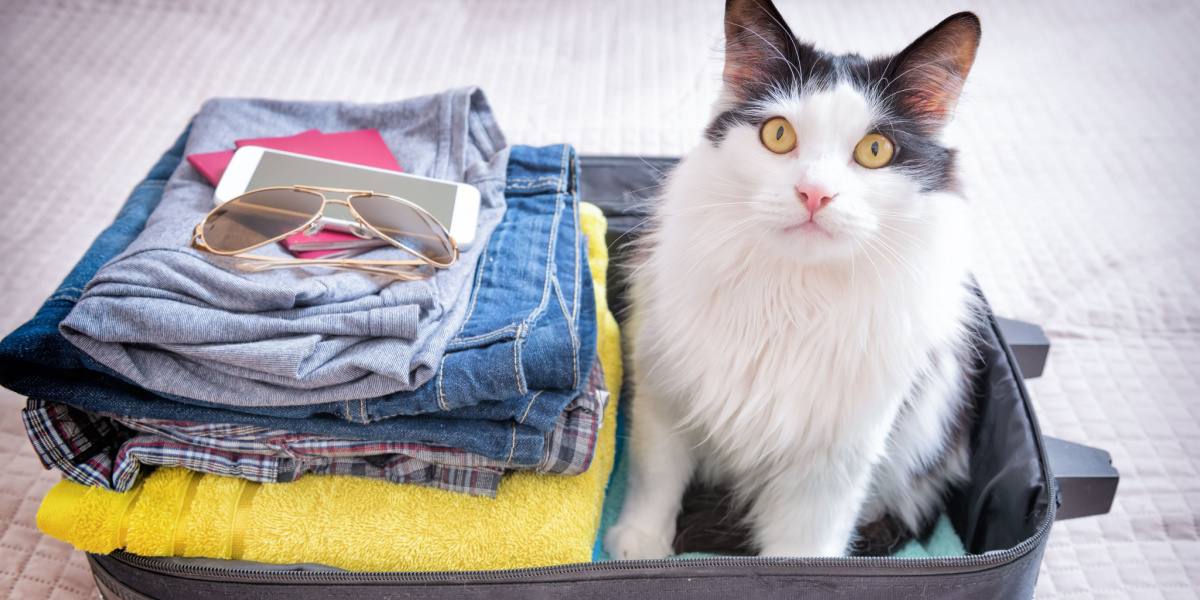
As much as we love our cats, they sometimes have odd or even frustrating ways of communicating with us. Take peeing on your husband’s things, for instance: What’s that all about?
Well, there are several reasons your cat might be doing this, ranging from a demonstration of love to medical conditions. Identifying the cause of unwanted behavior (like peeing in odd places) is important to understand how to discourage it.
Here are some common reasons cats pee outside the litter box (also called inappropriate urination), and more specifically, why they might pee on other people’s things:
1. Urinary Issues
Everyone deserves the benefit of the doubt. If your cat is peeing on your husband’s things, the first thing to do is to take them for a checkup with a veterinarian. Whenever a cat pees outside their litter box, it can be a sign that something is wrong.
Just like us, cats can get urinary tract infections (called UTIs), urinary stones, and kidney disease. Urinary tract issues can make cats pee in inappropriate places because they get the urge to go to the toilet and end up peeing wherever they happen to be at the time.
Keep an eye out for any signs of blood in your cat’s urine, such as a pink tinge or small blood clots, as this means your cat most likely has a urinary issue. Although if you don’t see blood, it doesn’t rule it out a urinary problem, so it’s a good idea to take a trip down to the veterinary clinic regardless.
2. Stress
Cats perceive and react to stress in different ways. It’s not always obvious that something is stressing a cat until they start showing certain behaviors like peeing in odd places. If, for example, you have any new additions to the family (human or otherwise), your cat might be peeing on different objects because they are stressed about the change in household dynamics.
So, if your cat has started peeing on your husband’s things, it’s worth spending a little time trying to work out if anything has recently changed in your house or immediate neighborhood that might be a stressor for them.
3. Territory Marking
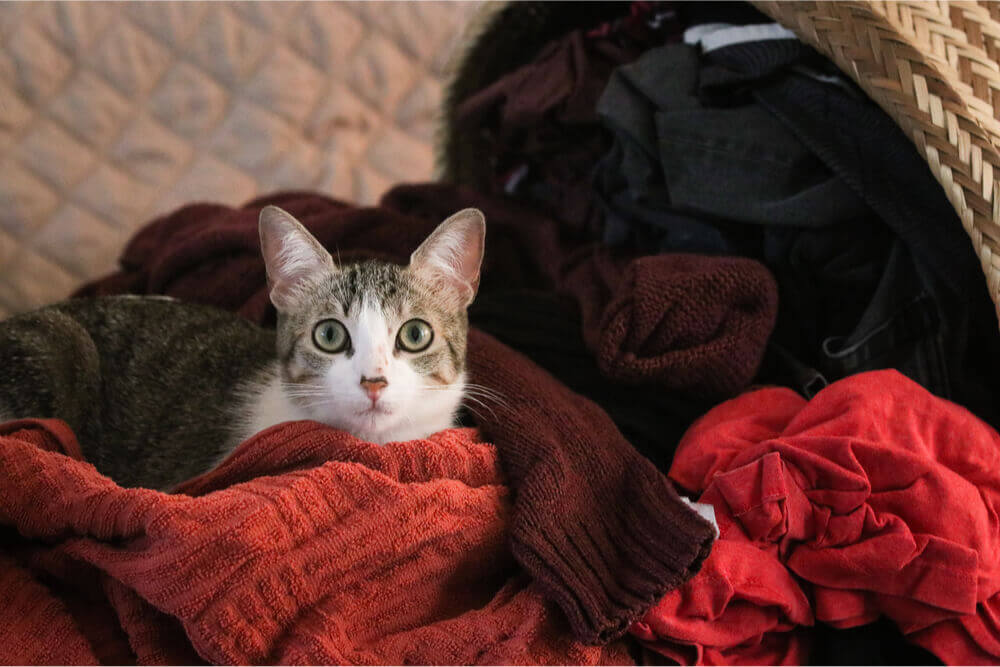
Marking behavior like urine spraying is more common in cats that are not spayed or neutered.
Cats are territorial. Both male and female cats will often mark their territory by spraying their urine on things. Perhaps you have a new household member, you’ve just moved house, or the neighbor has a new dog. Any of these things can make your cat feel their environment is threatened and make them start marking their territory by peeing on objects that are theirs.
4. Love
This one is probably a little surprising, but your cat may simply love your husband and is just showing affection in an odd way by peeing on his things. Certain smells make cats feel safe, such as your husband’s scent, and it can make them want to snuggle in and add their own scent to the object. An effective way to do this is to pee on it.
5. Litter Box Problems
Cats are very clean by nature, so a full litter box may lead them in search of somewhere else to do their business. If you have several cats, they may prefer to pee elsewhere if the litter box has already been used by one of their housemates.
So, we’ve established some reasons your cat might be peeing on your husband’s things, but what can you do about it? Here are five tips for keeping your husband’s things pee-free:
1. Take Your Cat For A Health Checkup
As we’ve already talked about, it’s important to rule out a medical reason for peeing in odd places and treat any underlying problems. Your veterinarian will most likely want to rule out a urinary tract problem and ask you about any potential stressors.
If you think your cat might be peeing on your husband’s things because they are anxious, ask your veterinarian for advice on how to manage your cat’s stress and anxiety, such as by establishing routines and introducing calming aids like pheromone sprays or anxiety medication.
2. Litter Boxes
Cats don’t like to share litter boxes. So, you should ideally have at least one litter box per cat to create a stress-free toileting experience for each of your feline family members. Cats also like to toilet in peace so try to spread the litter boxes out in various quiet, easily accessible locations throughout the house.
Bear in mind your cat’s age and agility when deciding where to place their litter box. Older cats might struggle to climb into a high-sided litter box or have trouble jumping up somewhere to access one.
If your cat keeps peeing on your husband’s things in a specific room, try to move their litter box to that area. There could be a good reason your cat is choosing to pee there. Perhaps it’s a particularly quiet area of your house, and your husband’s things make them feel more relaxed.
3. Remove The Temptation
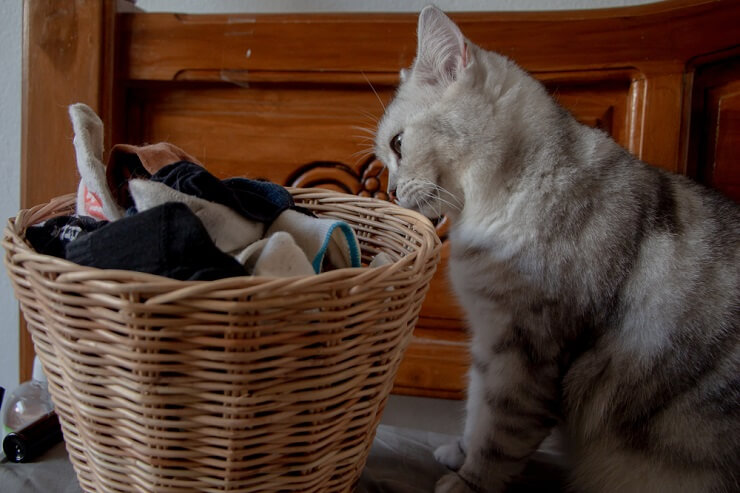
Put the close away and out of reach of your cat so they don’t continue to come back to pee again.
If your cat doesn’t have access to the objects, they can’t pee on them. Get your husband to tidy his laundry away into the wardrobe, and find a safe, cat-free spot to tidy other particular pee-targets away into.
4. Use A Urine-Removal Product
Even a tiny drop of urine on an object can attract your cat and make them repeatedly pee on the same thing. Your cat’s sense of smell is much stronger than yours, so although you’ve washed your husband’s things and can’t smell pee on them anymore, chances are your cat can. Baking soda, carpet cleaners, laundry detergents and enzymatic cleaners can help eliminate any traces of cat pee that escape the human nose.
5. Minimize Stress
Some stressors can’t be avoided, but try to pre-empt stress and put measures in place to minimize the effect on your cat, including:
- Making gradual introductions to new pets or people,
- Making sure your cat has a safe, quiet place to go to, away from any new members of the household, and
- Using pheromone diffusers in the lead-up to and during changes like new introductions, or a house move.
Also Read: How To Take Care Of A Kitten: The Complete Guide
In Summary
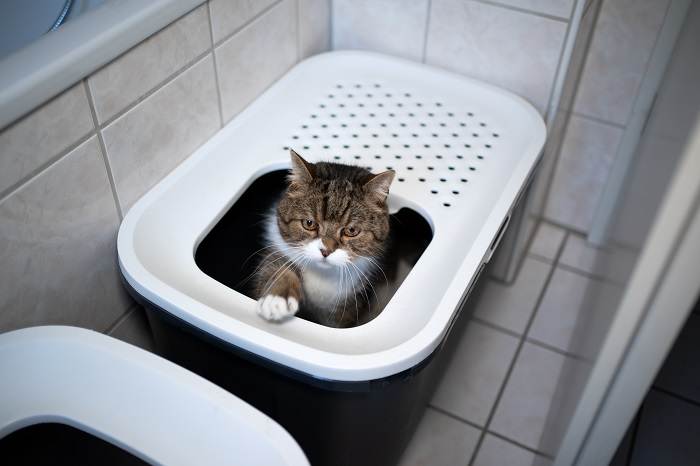
To encourage your cat to pee in their litter box, make sure you have enough boxes, they are easily accessible, and they are kept clean.
If your cat is peeing in odd places, start with a health check to look for and treat any urinary tract problems. If a medical problem has been ruled out, there’s a good chance your cat is peeing on your husband’s things out of affection for him. That doesn’t make this particular cat’s behavior any less frustrating though!
You can encourage your cat to pee in the litter tray instead of on your husband’s things by ensuring there are enough litter boxes in your house, tidying away popular pee targets, using urine removal products, and decreasing stress.
Also Read: 8 Best Cat Foods For Urinary Tract Health
